We have the honor to award 2 deserving candidates each year with a K12 grant for their CTS research, and we aim to expand that number to 4 per year in the future. The long-term goals of the LINCATS-K12 are to: (1) Develop a clear and sustainable pathway for the training of scholars and mentors focused on CTS; (2) Enhance the CTS scholar and mentor pipeline, emphasizing recruiting and retaining women, underrepresented groups, individuals with disabilities, and those from disadvantaged backgrounds; and (3) Create an innovative, robust, and sustainable infrastructure and methodology for learning and disseminating best practices in CTS training.
Awardees are matched with a Primary Research Mentor, receive 2 years of salary support ($125K per year), $25K in research supplies support, and a written commitment from their home department for 75% protected time for research and career development. Candidates may come from within LINCATS collaborating institutions or from other institutions.
The K12 Scholar Selection and Appointment Process >
Lauren M. Maloney, MD, NRP, FP-C, CIC, NCEE, FACEP, FAEMS
Clinical Assistant Professor, Dept. of Emergency Medicine
Adjunct Assistant Professor, Dept. of Biomedical Engineering
Police Surgeon & Medical Director, Stony Brook University Police Department
Medical Director, Stony Brook University Paramedic Program
Associate Medical Director, Division of Emergency Medical Services
Differentiating the cause of shortness of breath in patients calling 911 is clinically challenging and associated with high rates of misdiagnosis which leads to poor patient outcomes. Thoracic point-of-care ultrasonography (POCUS) is 90% sensitive and specific at diagnosing the underlying cause of shortness of breath and has been widely implemented in the prehospital setting by physicians in Europe. The most significant barrier to implementation in the U.S. is the cost associated with training paramedics; current POCUS simulation systems do not function well in the dynamic prehospital setting and are prohibitively expensive. Dr. Maloney's team has created a low-cost proof-of-concept thoracic POCUS simulation system which is able to compensate for a moving vehicle (ambulance, helicopter, boat) and subsequently display a series of pre-recorded ultrasound images. This therefore allows paramedics to practice obtaining and interpreting normal and pathological thoracic POCUS scans in their own unique work environment, thereby enabling subsequent clinical implementation of POCUS technology. Dr. Maloney's K12 focuses on iterative prototyping of the hardware, and further developing the software, to get to a prototype that is ready for robust proof-of-concept testing. Subsequently, the device will be implemented within a prehospital ultrasound education curriculum.
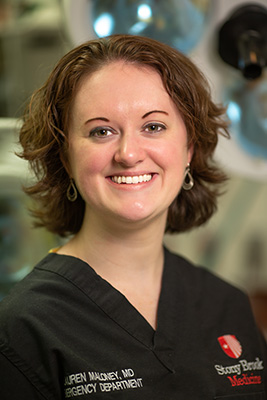
Zhaosheng Jin, MBBS, BSc
Assistant Professor, Department of Anesthesiology
"A Randomized, Controlled Trial to Evaluate if Pedometer-Guided Coaching Can Promote Postoperative Ambulation after Abdominopelvic Surgeries"
Dr. Zhaosheng Jin is an anesthesiologist with a research focus on improving postoperative outcomes through personalized and innovative use of mobile electronic devices, wearables, and digital health infrastructure. There is growing evidence that that increased physical activity, particularly walking, during the perioperative period (before and after surgery) is associated with better outcomes after surgery, such as shorter hospital stays, fewer complications, and reduced chance of hospital readmission. However, there is limited research into how lifestyle interventions after hospital discharge could influence patients’ postoperative recovery.

The clinical trial aims to answer two questions:
- Does pedometer-guided ambulation coaching increases ambulation after surgery?
- Does pedometer-guided coaching improve satisfaction, quality of recovery, while reducing postoperative complications?
We plan to randomize participants who have undergone major surgery to one of two options: step count tracking after surgery using a pedometer app, or step count tracking plus virtual coaching to encourage walking after surgery. Participants will be interviewed both before and 30 days after surgery. We are interested in what patients report about their recovery, including their quality of recovery, satisfaction, and the daily functions they are able to perform as they recover from the surgery.
This clinical trial will transform an observation - that walking more is associated with better postoperative outcomes - into an actionable intervention that could promote recovery after surgery. The insights gained from this study could also inform future development of perioperative digital health initiatives to provide accessible support for patients as they undergo their postoperative journey.
Andrew S. Handel, MD, FAAP
Assistant Professor of Clinical Pediatrics, Division of Infectious Diseases
"Rickettsia amblyommatis as an Emerging Tick-Borne Pathogen"
Dr. Handel is studying the impact of Rickettsia amblyommatis infections on human health. This microbe is found in more than half of lone star ticks on Long Island, yet little is known about its effect on children and adults. The few patients who have been infected with R. amblyommatis seemingly had mild, self-resolving illnesses, but we suspect a wide range of associated symptoms. We also believe that many people with positive antibody tests for R. Rickettsii (the cause of Rocky Mountain spotted fever, a severe illness) are actually infected with R. amblyommatis. This likely leads to anxiety and unnecessary antibiotics. A better understanding of R. amblyommatis will help to avoid confusion and to inform better diagnostic and treatment decisions.
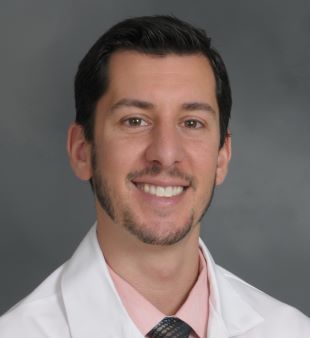
To describe the impact of R. amblyommatis, we plan to enroll children on Long Island who have been recently bitten by ticks. We will test blood samples collected within 2 weeks of the tick bite and again 1-2 months later for antibodies against multiple Rickettsia species. Development of antibodies will signify a recent infection. We will also ask parents about any symptoms that develop during the study period. We will correlate the presence of antibodies with associated symptoms to identify illnesses resulting from R. amblyommatis. We also plan to use a novel device for collecting blood samples. This tool can be applied by the patient’s parent at home and is nearly painless, making it easier for families to participate in the study.
In a related study, we will use residual blood samples from children tested for Lyme disease to determine the proportion with evidence of a prior R. amblyommatis infection. Blood samples will undergo screening for antibodies against three Rickettsia species. The results will give us to better understand the extent of R. amblyommatis infections occurring in children on Long Island.
By identifying the symptoms caused by R. amblyommatis infections and the rate of prior infection, we hope to describe the impact of this emerging pathogen on children’s health.
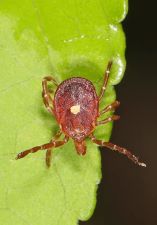
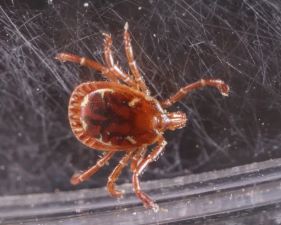
Clare Whitney, PhD, MBE, RN
Assistant Professor, Department of Doctoral Studies, School of Nursing
"Engaging Clinician Outcomes and Moral Dimensions of Practice to Advance Sustainable Solutions for Wellness (EnCOMPASS-Wellness)"
Dr. Whitney is studying the interpersonal mechanisms and modifiable factors that contribute to clinician burnout. The wellbeing of clinicians on the front line of care delivery is crucial for the provision of high quality, compassionate patient care, with overwhelming evidence demonstrating the detrimental impact that clinician-level factors such as communication challenges, moral distress, burnout, and mental and physical health strain have on patient outcomes. These same indicators of clinician wellbeing are also associated with concerning workforce outcomes, like attrition from practice through early retirement, career changes that involve pivoting away from the bedside or the discipline entirely, or severe mental-health related morbidity or mortality. Importantly, these workforce outcomes can amplify aspects of the healthcare work environment – such as dangerously high patient ratios and inadequate time to provide care – creating a positive feedback loop that perpetuates both clinician and workplace (un)wellness, and reinforces poor patient outcomes as a consequence.
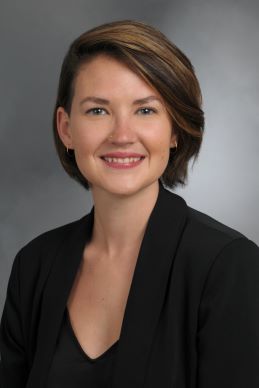
In order to advance sustainable approaches to improve clinician wellbeing, we aim to determine how contributing conditions related to workplace wellness interact and come to impact care delivery. We plan to conduct a mixed methods secondary analysis of data collected from Stony Brook Medicine clinicians who participated in the Alda Healthcare Experience -- a medical improvisation workshop designed to improve interprofessional communication skills. First, we will determine the association between personal and interpersonal clinician-level factors and clinician wellbeing, and triangulate quantitative findings with qualitative data from interviews with clinicians. After characterizing the dimensions of clinician wellbeing from this cohort of healthcare professionals, we will extend and refine a preliminary theory on clinician wellbeing in a new cohort of clinicians practicing at a different university-affiliated academic medical center.
By leveraging the interpersonal mechanisms that underlie how clinician wellbeing impacts care delivery, we hope to uncover future directions for the development of sustainable wellness interventions that target the modifiable dimensions underpinning both clinician and workplace (un)wellness.
April Castillo, PhD
Resident, Family, Population, and Preventive Medicine
"Assessing whether antenatal colostrum expression improves duration of breastfeeding and rates of breastfeeding exclusivity"
Antenatal hand expression of colostrum, or antenatal colostrum expression (ACE) promotes positive breastfeeding outcomes; it is believed to prevent delayed lactogenesis II (helps milk to come in sooner), and it provides mothers with stored colostrum in case her child needs supplementation, preventing the need for early formula supplementation. Additionally, it increases maternal confidence in their ability to breastfeed and comfort with the skill of hand expression. However, this skill has not traditionally been taught to pregnant women due to unproven concerns about the possibility of impacting birth outcomes. Multiple recent studies have shown the safety of ACE, however little research has been done on the efficacy of ACE education programs towards improving breastfeeding outcomes. The purpose of this unblinded randomized controlled trial will be to test the theory that counseling women on antenatal hand expression of colostrum will increase duration of breastfeeding and rates of breastfeeding exclusivity. A secondary measure will be time to lactogenesis, measured with milk biomarkers to see when composition of milk changes.
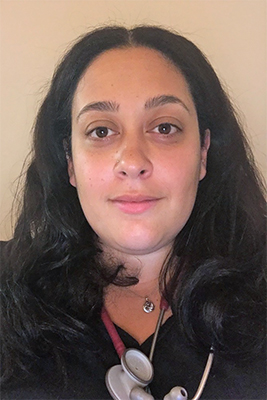
Dr. April Castillo is a Preventive Medicine physician who focuses on maternal and infant health and breastfeeding medicine, with an emphasis on decreasing health disparities. Her goal is to improve breastfeeding/chestfeeding support for parent-infant dyads, to increase breastfeeding rates and prevent death and chronic disease for infants and birthing parents.
Amanda Levinson, PhD
Counselor, Postdoctoral Fellow
Stony Brook University Psychology Consortium
"Developing an Ecologically Valid Toolkit for the Assessment of Postpartum Maternal Reward Responsiveness"
Dr. Amanda Levinson uses EEG, a non-invasive affective neuroscience technique, to study the way the human brain adapts to parenthood. Her goal is to better understand how we can best support parents as they take on the challenging and important role of caregiver.
The first year of parenting a new baby can be a wonderful period of growth and development (for parents as well as for the baby), but it can also be a challenging time with many unique demands and pressures. The adjustment to parenthood is a time when new mothers are at increased risk for depression and anxiety. Brain responses to rewards are an important indicator of mental health.
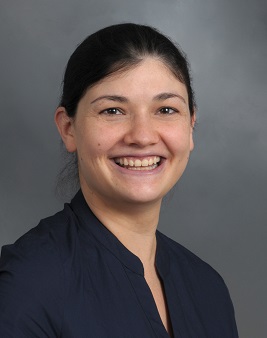
Currently, there are no research methods for specifically measuring the unique rewards of early parenthood. As an SBU LINCATS fellow, Dr. Levinson is using interviews with new mothers (within the first year after baby is born) to find out what they see as most rewarding about their role as parents. Dr. Levinson's study will then use EEG/ERP techniques to measure brain responses to these specific rewarding experiences of parenting. The goal of this study is to create effective, reliable ways to measure responsiveness to the rewards of new parenting.
